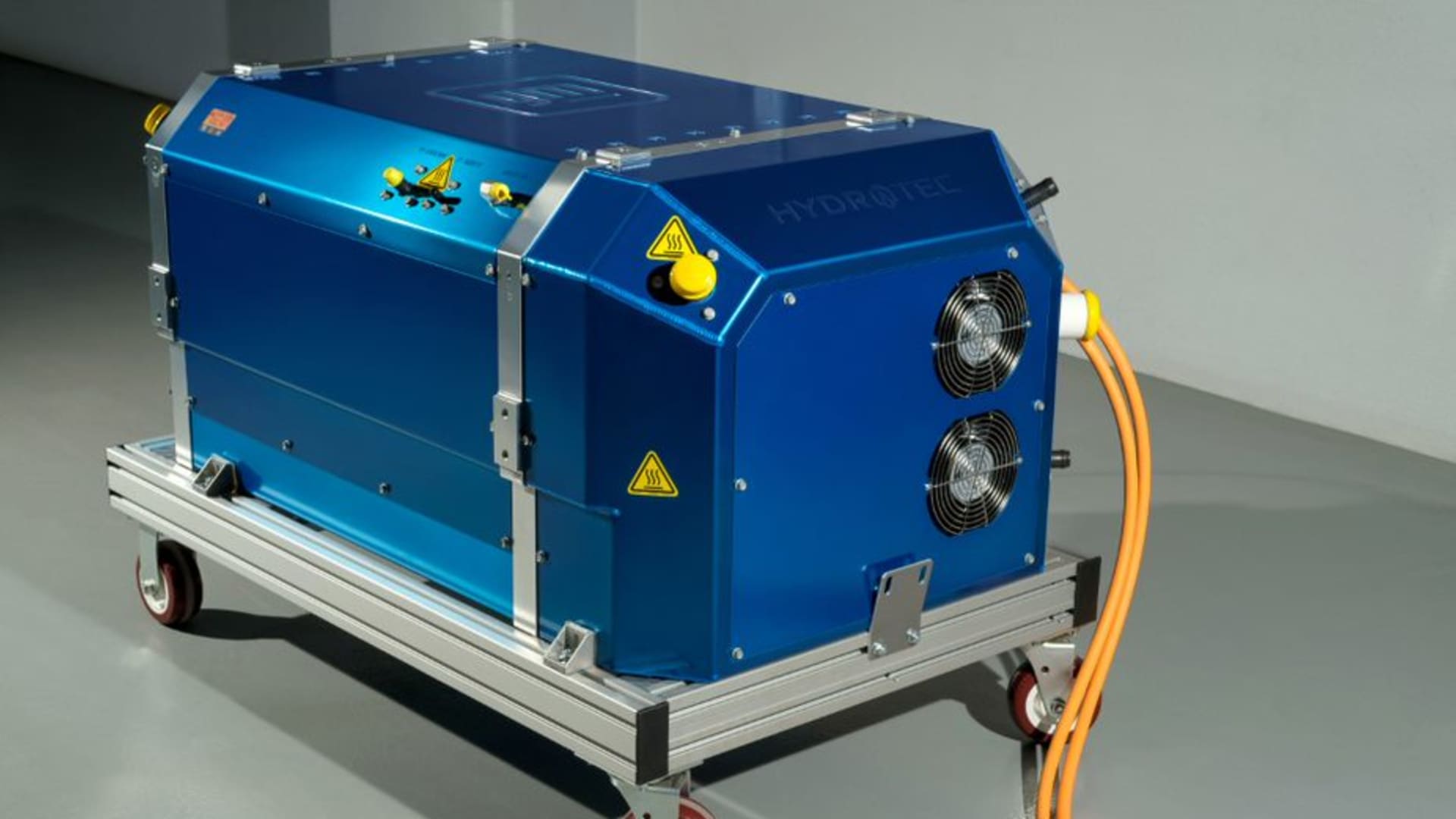
- GM's plans for hydrogen fuel cells, a long-promised technology, are beginning to take shape as company pours $35 billion into electric and autonomous vehicles through 2025.
- GM sees tremendous opportunities for fuel cells in the military, commercial vehicles and other forms of transportation, such as rail and maritime.
- Hydrogen fuel-cell electric vehicles and equipment operate much like battery-electric ones but are powered by electricity generated from hydrogen and oxygen instead of pure batteries.

General Motors' plans for hydrogen fuel cells, a long-promised technology, are beginning to take shape as the company pours $35 billion into electric and autonomous vehicles through 2025.
GM began working on fuel cells more than 50 years with little to no commercial success. But it aims to change that in coming years with its Hydrotec fuel-cell system, which could be a dark horse business to grow GM's operations outside of automotive.
Get San Diego local news, weather forecasts, sports and lifestyle stories to your inbox. Sign up for NBC San Diego newsletters.
GM sees tremendous opportunities for fuel cells in the military, commercial vehicles and other forms of transportation, such as rail and maritime. GM is exploring those areas and more as a complementary solution to its emerging battery-electric vehicle business, known as Ultium.
"Batteries have a role to fill, but to fully electrify and deal with the breadth of the different applications that we're talking about, you also have to have hydrogen fuel cells," said Charlie Freese, who leads GM's global fuel cell business. "They complement each other extremely well."
Money Report
Hydrogen fuel-cell electric vehicles and equipment operate much like battery-electric ones but are powered by electricity generated from hydrogen and oxygen instead of pure batteries, with water vapor as the only by-product. They're filled up with a nozzle almost as quickly as traditional gas and diesel vehicles.
As a general rule of thumb, Freese said, batteries are best utilized to replace vehicles and equipment that use gasoline, while fuel cells are better for longer ranges and vehicles such as semitrucks that use diesel fuel.
"Every market is going to be a little bit different, but what is clear is the world's moving toward electrification," he said. "The fuel cell technology has moved down the cost curve dramatically, and it continues to do that."
GM said last week it plans to launch its third-generation Hydrotec fuel cells with even greater power density and lower costs by mid-decade.
Expanding GM
Fuel-cell vehicles face the same challenges as BEVs, including consumer acceptance, fueling infrastructure and cost. It's one of the reasons GM is looking outside of automotive to help drive demand.
GM announced Thursday a deal with Liebherr-Aerospace to develop a hydrogen fuel-cell power generation demonstrator system for aircrafts. That announcement came two days after the automaker said it signed a memorandum of understanding with Wabtec Corp. to engineer and supply battery and hydrogen fuel-cell systems for freight locomotives.
GM also has agreements or partnerships regarding Hydrotec with Navistar and embattled EV start-up Nikola. The programs are in addition to several prior ones between GM and the U.S. military involving hydrogen fuel cells, including a pickup truck and an underwater unmanned vessel.
"We use kind of a land, sea and air approach," Freese said. "It's energy storage density for long missions, quick refueling and quiet stealth, low thermal initiatives. Those are things that are very important in those applications. And those carry over to some of the other [industries]."
Freese said GM expects to commercialize fuel cells for real world solutions "soon," declining to elaborate on those plans. GM has a joint venture with Honda Motor, which offers a fuel-cell vehicle called the Clarity, to develop and produce fuel cells at a plant in Michigan.
The most near-term product that GM has announced is with Illinois-based truck manufacturer Navistar. The companies earlier this year announced a collaboration on a fuel-cell-powered semitruck.

J.B. Hunt Transport is expected to be the first customer to pilot the semitrucks and hydrogen fueling system at the end of 2022, according to the companies. The first trucks are expected to be available for sale in 2024.
'Uncertain' future
Many believe hydrogen can help decarbonize industries where batteries fall short due to their lower energy density and higher weight. But the technology is still expected to take a backseat to BEVs, which are cheaper and easier for consumers and companies to understand.
"Hydrogen's transportation future looks more uncertain given the tug of war with batteries," BTIG analyst Gregory Lewis said in a recent note to investors. "We expect hydrogen to be used in niche applications."
Tesla CEO Elon Musk, whose company exclusively offers BEVs, has called fuel cells a "fool cells" and "mind-bogglingly stupid."
But there is a growing market for the technologies amid an increase in legislations globally around decarbonization, officials say. Fortune Business Insights forecasts the global fuel-cell market will be $29 billion by 2028.
The key, as GM is targeting, may be bringing down the costs for commercial customers, many of whom have set routes and on-site fueling, rather than consumers.
"Industrial applications like steel, refining, and chemicals where green hydrogen can be produced and consumed on-site (avoids transportation costs) look poised to be early adopters of green hydrogen," Lewis said. "Additionally, hydrogen for industrial use is already gaining traction in some nations' zero-emissions policies."
– CNBC's Michael Bloom contributed to this report.






